|
|
|
Sort Order |
|
|
|
Items / Page
|
|
|
|
|
|
|
| Srl | Item |
| 1 |
ID:
193067
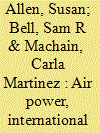

|
|
|
|
|
| Summary/Abstract |
Can the presence of international organizations reduce civilian deaths caused by aerial bombing? This commentary examines this question in the specific context of the U.S.-led war in Afghanistan. We evaluate this based on interviews conducted with members of international organizations that were present in Afghanistan during the conflict, existing intergovernmental organizations, nongovernmental organizations, and government reports, and with quantitative data on civilian casualties between 2008 and 2013. We conclude that there is tentative evidence from Afghanistan that international organizations can in fact reduce the severity of civilian killings that result from the use of air power. However, there is much need for greater data sharing to more fully answer this important question.
|
|
|
|
|
|
|
|
|
|
|
|
|
|
|
|
| 2 |
ID:
138301


|
|
|
|
|
| Summary/Abstract |
What determines the location of those human rights international non-governmental organization (INGO) resources found outside of the highly developed Western democracies? We draw a distinction between the bottom-up mobilization processes driving the location of human rights organization (HRO) members from the top-down strategic concerns driving where HRO leaders place permanent offices. In particular, we find that, while political opportunity structures generally increase the likelihood that a state has HRO members, it has a curvilinear influence on the number of HRO secretariats, which typically locate in areas seen as having a higher need for organizational resources. Further, while there is no clear connection between human rights abuses and HRO memberships in a state, HROs' strategic concerns lead them to place offices with reference to both local and neighborhood “need”—in other words, levels of repression.
|
|
|
|
|
|
|
|
|
|
|
|
|
|
|
|
| 3 |
ID:
159578


|
|
|
|
|
| Summary/Abstract |
Why do minor powers ever resist the demands of major powers? Although recent work has begun to provide answers to this question, we argue that research has missed a vital piece of bargaining dynamics in dyadic research: third-party influence. Using spatial modeling techniques with the Militarized Interstate Dispute and International Crisis Behavior datasets, we improve upon previous models of asymmetric conflict by showing that the presence of a neighboring rival of a minor power, and the relationship that rival has with a major power, conditions the likelihood that weak actors choose to fight the strong. The recent examples of Pakistan and Iraq, after the 9/11 terrorist attacks in the United States, serve as ideal types in which minor powers are respectively less and more likely to resist the demands of major powers. We find quantitative support that regional rivalries can act as both constrainers and enablers for minor powers when bargaining with major powers.
|
|
|
|
|
|
|
|
|
|
|
|
|
|
|
|
| 4 |
ID:
162774
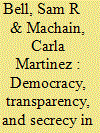

|
|
|
|
|
| Summary/Abstract |
Why is it that some democracies are able to effectively engage in secrecy and mobilize their forces privately, while others are unable to keep enough information secret to effectively carry out such an attack? Recent work by Colaresi (2014) suggests that a democracy's ability to keep information secret depends on its retrospective oversight institutions, which allow democracies to keep information secret in the present with the promise of revealing it to the public in the future. Though Colaresi (2014) finds that states with retrospective oversight have greater military spending, more support for military action, and more success in crises, to our knowledge there has yet to be empirical support for the argument that democracies with greater retrospective oversight can actually conduct foreign policy with greater opacity than those without retrospective oversight. In this research note we empirically explore this question, using data on private mobilizations by democracies with varying levels of retrospective oversight. This gives us greater insight into strategic military choices and shows how military effectiveness can be affected by political institutions.
|
|
|
|
|
|
|
|
|
|
|
|
|
|
|
|
| 5 |
ID:
156533
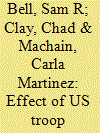

|
|
|
|
|
| Summary/Abstract |
US noninvasion troops deployed abroad often try to promote greater respect for human rights in the host country. The host country, having an incentive to retain the troop presence, may choose to comply with these requests. We argue that this effect will not be at play in states with high security salience for the United States (US) (for which the US may not be able to credibly threaten to remove the troops). In these cases, US deployments will provide the leader with security from both internal and external threats that is independent of the local population’s support for the leader. Host state leaders thus become less reliant on (and potentially less responsive to) their local populations, which in turn may lead to increased human rights violations. In this article, we use data on both US troop deployments abroad and on human rights violations to test these arguments from 1982 to 2005.
|
|
|
|
|
|
|
|
|
|
|
|
|
|
|
|
| 6 |
ID:
163442


|
|
|
|
|
| Summary/Abstract |
Which countries are likely to be ignored for their human rights abuses? This article focuses on one particular way that cases of human rights abuse might be overlooked by human rights organizations (HROs): the relative visibility of the state’s abusiveness vis-à-vis its geographic and social peers. HROs are more likely to target abusive states that are located in regions with more HRO resources and/or are surrounded by states that demonstrate higher respect for human rights, as these abuses will stand out much more clearly. Further, human rights treaties can be used by abusive states as a form of strategic “social camouflage,” with states trying to minimize the risk of HRO attention by ratifying human rights treaties to look more like their rights-respecting peers. Using a cross-national time-series research design, this article finds much support for the argument: abusive states that “join the chorus” avoid HRO attention.
|
|
|
|
|
|
|
|
|
|
|
|
|
|
|
|
| 7 |
ID:
186338
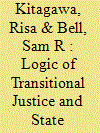

|
|
|
|
|
| Summary/Abstract |
Human rights prosecutions addressing wartime crimes are often credited with deterring future rights abuses, but routinely occur alongside state repression. This article develops a theory of how such prosecutions generate uneven effects across domestic human rights practice by making some repression tactics costlier than others—in the public visibility of the abuse or ease of attribution to leadership—or by directly substituting certain tactics. We test the implications with a multivariate probit analysis of novel prosecution data in contemporary conflict and post-conflict settings. Trials significantly reduce reliance on political imprisonment and extrajudicial killings, relatively visible abuses, whereas gains for less visible physical integrity rights are limited. Further, trials themselves are sometimes deployed as a direct substitute for political imprisonment. The findings reveal how human rights prosecutions themselves can be part of a government’s repressive toolkit, with implications for the study of transitional justice and the judicialization of repression.
|
|
|
|
|
|
|
|
|
|
|
|
|
|
|
|
| 8 |
ID:
138304
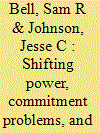

|
|
|
|
|
| Summary/Abstract |
Many scholars argue that leaders' expectations about future shifts in the distribution of power can result in preventive war. If a leader expects her adversary to be significantly stronger in the future, the leader may choose to go to war with that adversary rather than bargain with a stronger adversary in the future. However, quantitative evaluations of this argument prove difficult, as they require a measure of leaders' expectations about future shifts in power rather than simply a measure of observed power. In this paper, we develop an empirical model of future power to create this measure. We then use that measure to evaluate the preventive war hypothesis. Our results support the preventive war hypothesis. Increases in a state's expected future probability of winning in war increase its probability of another state in a dyadic relationship initiating war against it.
|
|
|
|
|
|
|
|
|
|
|
|
|
|
|
|
| 9 |
ID:
161435


|
|
|
|
|
| Summary/Abstract |
U.N. peacekeeping missions succeed in preventing the resumption of conflict and saving lives. At the same time, a series of sexual exploitation and abuse scandals since the early 2000s has raised concerns about the conduct of peacekeepers. We examine a related, but generally overlooked, potential negative externality of peacekeeping missions: the forced trafficking of sex workers. We argue that U.N. peacekeepers increase demand for sex work and that this demand may be met through human trafficking for forced prostitution. Using data on U.N. peacekeeping missions between 2001 and 2011, we evaluate the effect of a peacekeeper presence on human sex trafficking in and around the host state. We find that the presence of U.N. peacekeeping forces correlates positively with a state being cited as a destination for forced prostitution. This has important implications for the future deployment of peacekeeping forces around the world.
|
|
|
|
|
|
|
|
|
|
|
|
|
|
|
|
|
|
|
|
|